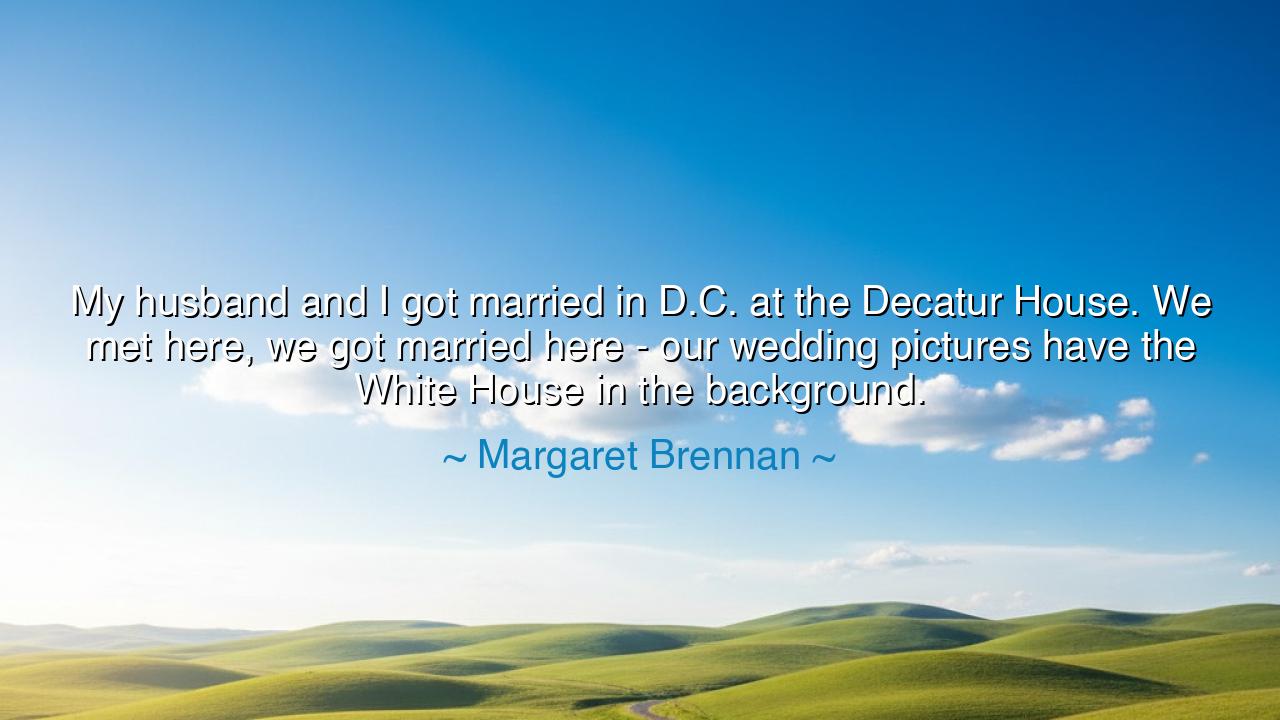
My husband and I got married in D.C. at the Decatur House. We
My husband and I got married in D.C. at the Decatur House. We met here, we got married here - our wedding pictures have the White House in the background.






The words of Margaret Brennan—“My husband and I got married in D.C. at the Decatur House. We met here, we got married here—our wedding pictures have the White House in the background.”—carry the resonance of memory woven into place. They remind us that love is not only between two souls, but also bound to the soil and the stones where it blossoms. To meet in a city, to wed in the same, and to preserve its symbols in one’s wedding pictures is to declare that love itself is part of the history and spirit of that place.
This utterance is a meditation on the sacredness of setting. Just as temples hold the prayers of generations and battlefields hold the blood of heroes, so too do houses and cities hold the stories of love. In Brennan’s tale, D.C. is more than a capital; it is the stage of her destiny, where chance encounter grew into covenant. The presence of the White House in the background is not mere decoration, but a reminder that her private joy was joined to the larger narrative of a nation.
History offers a reflection in the story of John and Abigail Adams, whose love letters, written while John served in the halls of early American power, blended the intimacy of affection with the weight of public duty. Their bond was rooted in both personal devotion and the soil of a young republic. Like Brennan, they remind us that love does not float apart from history—it is lived within it, shaped by it, and immortalized against its landmarks.
The quote also speaks to the desire for permanence. Lovers take their vows not only before witnesses, but also before the eyes of place itself. To stand with the White House in the background is to anchor one’s story within the enduring stones of power and history, so that even as years pass and memory fades, the photograph testifies: “Here, love was made eternal.”
Let this wisdom be handed down: choose well the places where you bind your vows, for they will become part of the story you leave behind. Love is strengthened when it is rooted not only in hearts, but in the ground where it is declared. As Margaret Brennan shows, a wedding is more than a moment—it is a weaving of love into the very fabric of history, so that personal joy and the destiny of place may stand together, side by side, for generations to behold.






PRpeach ruby
What stands out to me is the connection between love and legacy. The Decatur House and the White House aren’t just backdrops—they’re symbols of history, stability, and tradition. It makes me reflect on how weddings often blend the personal and the cultural. Do people subconsciously choose such places because they want their union to feel timeless, rooted in something enduring?
ノGCL ノDang Gaming
This quote makes me think about how place can shape our most important memories. Having the White House in the background must make the photos feel both personal and iconic. I wonder—do people choose such meaningful venues for their emotional value, or because they want their love story to be part of something bigger, tied to history and identity?
KTKhoi Tran
There’s something poetic about choosing to marry where your story began. It gives the feeling of closing one chapter and opening another in the same place. I’m curious—was it the sentimental value of the location or the historic charm of D.C. that made it special? Sometimes, the setting itself becomes a silent witness to a couple’s journey.
NNnguyetanh nguyen
I find it really beautiful how the story ties love and place together. Meeting, marrying, and taking pictures all in one city creates such a strong sense of continuity. It makes me think about how geography becomes part of a relationship’s identity. Have you ever felt that a certain city or place holds emotional weight because of the memories built there?
XTNguyen Xuan Truong
That sounds like such a meaningful and symbolic place to get married—tying personal memories to a location filled with national history. I wonder if being surrounded by those landmarks adds a sense of gravity or pride to the ceremony, or if it feels more like a personal connection to the city itself. Does the significance of the place deepen the meaning of the marriage in some way?